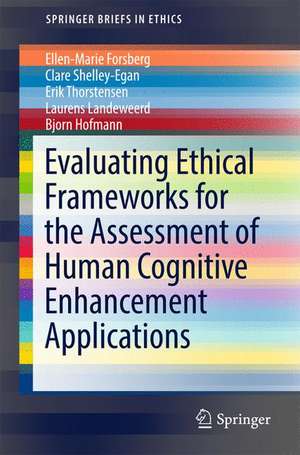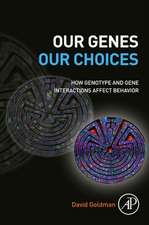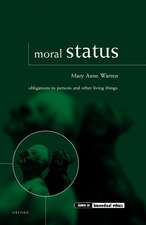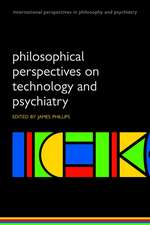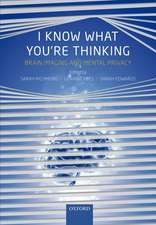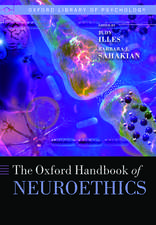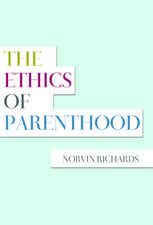Evaluating Ethical Frameworks for the Assessment of Human Cognitive Enhancement Applications: SpringerBriefs in Ethics
Autor Ellen-Marie Forsberg, Clare Shelley-Egan, Erik Thorstensen, Laurens Landeweerd, Bjorn Hofmannen Limba Engleză Paperback – 31 mar 2017
This book offers the policy-maker or decision-maker key insights and practical information regarding the features of ethics frameworks best suited to the ethical assessment of human cognitive enhancement (HCE) applications, such as pharmaceutical cognitive enhancers and noninvasive brain stimulation techniques. This book takes as its departure point the entrenched philosophical debate between opponents and proponents of HCE and the increased feasibility of some applications of HCE. Recent calls for policy-making in the area of human enhancement reflect the need to find a balance between addressing current ethical issues and issues that are more speculative in nature or are underpinned by abstract philosophical concepts. Practical ethical approaches for policy or decision-making should enable the development of an evidence base for the risks and benefits of HCE applications. Moreover, such practical approaches should also incorporate a broader range of value bases that would facilitate convergence regarding certain decisions and judgements. This book identifies and evaluate tools that help us to go beyond polarised philosophical debates in order to assist practical decision makers in concrete ethical deliberation and decision-making. The focus is on systematic methods with which to identify relevant ethical values and assess the impacts of an HCE application on those values in order to facilitate decision-making regarding the ethical acceptability or desirability of the application.
Din seria SpringerBriefs in Ethics
-
 Preț: 84.28 lei
Preț: 84.28 lei -
 Preț: 377.18 lei
Preț: 377.18 lei -
 Preț: 343.13 lei
Preț: 343.13 lei -
 Preț: 353.67 lei
Preț: 353.67 lei -
 Preț: 377.18 lei
Preț: 377.18 lei -
 Preț: 408.44 lei
Preț: 408.44 lei -
 Preț: 474.84 lei
Preț: 474.84 lei -
 Preț: 343.21 lei
Preț: 343.21 lei -
 Preț: 378.71 lei
Preț: 378.71 lei -
 Preț: 410.77 lei
Preț: 410.77 lei -
 Preț: 377.95 lei
Preț: 377.95 lei -
 Preț: 378.34 lei
Preț: 378.34 lei - 15%
 Preț: 461.87 lei
Preț: 461.87 lei -
 Preț: 414.72 lei
Preț: 414.72 lei -
 Preț: 478.53 lei
Preț: 478.53 lei - 15%
 Preț: 461.73 lei
Preț: 461.73 lei -
 Preț: 377.95 lei
Preț: 377.95 lei -
 Preț: 376.80 lei
Preț: 376.80 lei -
 Preț: 377.95 lei
Preț: 377.95 lei -
 Preț: 477.34 lei
Preț: 477.34 lei -
 Preț: 350.81 lei
Preț: 350.81 lei -
 Preț: 377.95 lei
Preț: 377.95 lei -
 Preț: 174.24 lei
Preț: 174.24 lei -
 Preț: 477.17 lei
Preț: 477.17 lei -
 Preț: 476.57 lei
Preț: 476.57 lei -
 Preț: 476.79 lei
Preț: 476.79 lei -
 Preț: 478.71 lei
Preț: 478.71 lei -
 Preț: 174.83 lei
Preț: 174.83 lei -
 Preț: 259.41 lei
Preț: 259.41 lei -
 Preț: 259.57 lei
Preț: 259.57 lei -
 Preț: 408.44 lei
Preț: 408.44 lei -
 Preț: 259.19 lei
Preț: 259.19 lei -
 Preț: 410.55 lei
Preț: 410.55 lei - 15%
 Preț: 463.03 lei
Preț: 463.03 lei -
 Preț: 411.16 lei
Preț: 411.16 lei - 15%
 Preț: 463.03 lei
Preț: 463.03 lei -
 Preț: 475.06 lei
Preț: 475.06 lei -
 Preț: 374.08 lei
Preț: 374.08 lei -
 Preț: 408.82 lei
Preț: 408.82 lei
Preț: 375.45 lei
Nou
Puncte Express: 563
Preț estimativ în valută:
71.85€ • 74.56$ • 60.05£
71.85€ • 74.56$ • 60.05£
Carte tipărită la comandă
Livrare economică 15-29 martie
Preluare comenzi: 021 569.72.76
Specificații
ISBN-13: 9783319538228
ISBN-10: 3319538225
Pagini: 76
Ilustrații: IX, 62 p.
Dimensiuni: 155 x 235 x 4 mm
Greutate: 0.12 kg
Ediția:1st ed. 2017
Editura: Springer International Publishing
Colecția Springer
Seria SpringerBriefs in Ethics
Locul publicării:Cham, Switzerland
ISBN-10: 3319538225
Pagini: 76
Ilustrații: IX, 62 p.
Dimensiuni: 155 x 235 x 4 mm
Greutate: 0.12 kg
Ediția:1st ed. 2017
Editura: Springer International Publishing
Colecția Springer
Seria SpringerBriefs in Ethics
Locul publicării:Cham, Switzerland
Cuprins
Introduction.- Ethical tools as vehicles for practical, ethical dialogue.- Ethical concerns: cognitive enhancing drugs and noninvasive brain stimulation.- Methodology.- Cognitive enhancing drugs.- Risk and efficacy.- Authenticity and naturalness.- Fairness and personal achievement.- Distributive justice.- Coercion.- Noninvasive brain stimulation.- Ethical issues specific to transcranial direct current stimulation.- Further arguments in favour of cognitive enhancement.- Frameworks relevant for assessing HCE applications.- Principle based ethics.- The ethical matrix.- The ETICA framework.- Anticipatory ethics for emerging technologies.- Ethical Technology Assessment.- Ethical Constructive Technology Assessment.- Ethical Impact Assessment.- The adequacy of the frameworks for ethical assessment of HCE applications.- Principle based ethics.- The ethical matrix.- The ETICA framework.- Anticipatory ethics for emerging technologies.- Ethical Technology Assessment.- Ethical Constructive Technology Assessment.- Ethical Impact Assessment.- Summary.- Some final reflections.- Conclusion.- Acknowledgements.- References.
Notă biografică
Ellen-Marie Forsberg is a senior researcher with a PhD in applied ethics on methods for ethical assessment of genetically modified food. Her research interests include assessment of emerging science and technology, responsible research and innovation and applied ethics in different innovation areas. Forsberg has been the project leader of several larger Norwegian and European research projects and is the head of research at the Work Research Institute at Oslo and Akershus University College.
Clare Shelley-Egan is a senior researcher with a PhD in Science and Technology Studies. Her research interests include ethics and governance of new and emerging technologies, technology assessment and regulation of new technologies. Her subject areas include responsible research and innovation, applied ethics, research ethics, research and innovation policy, nanoscience and nanotechnology, nanoethics and regulation of nanotechnologies.
Erik Thorstensen has an MA in history of religions, worked in the area of bioethics in the Norwegian National Research Ethics Committees and with history culture and didactics at the Center for Studies of the Holocaust and Religious Minorities. His current interests include ambient assisted living technologies and responsible innovation; histories of technologies; and assessment of technologies.
Laurens Landeweerd
Laurens Landeweerd is a senior researcher who also holds a position as assistant professor at Radboud University Nijmegen’s Institute for Science Innovation and Society. His research areas include human enhancement, problems of justification in philosophy, ELSA/RRI and theory of ethics. He is interested in the area of social, philosophical and ethical issues in biotechnology innovation, more specifically the relation between science and technology, the status of knowledge, the acceptability and justification of specific innovation trajectories (in both medical and industrial biotechnology).
Bjørn Hoffman
Bjørn Hofmann is a professor at the Norwegian University of Science and Technology at Gjøvik and an adjunct professor at the Centre for medical ethics at the University of Oslo. He holds a PhD in philosophy of medicine and is trained both in the natural sciences and in the humanities. His main research interests are philosophy of medicine, philosophy of science, technology assessment, and bioethics. Hofmann teaches ethics, philosophy of science, and philosophy of medicine, at the levels Ba, Ma, and PhD.
Textul de pe ultima copertă
This book offers the policy-maker or decision-maker key insights and practical information regarding the features of ethics frameworks best suited to the ethical assessment of human cognitive enhancement (HCE) applications, such as pharmaceutical cognitive enhancers and noninvasive brain stimulation techniques. This book takes as its departure point the entrenched philosophical debate between opponents and proponents of HCE and the increased feasibility of some applications of HCE. Recent calls for policy-making in the area of human enhancement reflect the need to find a balance between addressing current ethical issues and issues that are more speculative in nature or are underpinned by abstract philosophical concepts. Practical ethical approaches for policy or decision-making should enable the development of an evidence base for the risks and benefits of HCE applications. Moreover, such practical approaches should also incorporate a broader range of value bases that would facilitate convergence regarding certain decisions and judgements. This book identifies and evaluate tools that help us to go beyond polarised philosophical debates in order to assist practical decision makers in concrete ethical deliberation and decision-making. The focus is on systematic methods with which to identify relevant ethical values and assess the impacts of an HCE application on those values in order to facilitate decision-making regarding the ethical acceptability or desirability of the application.
Caracteristici
Includes supplementary material: sn.pub/extras
